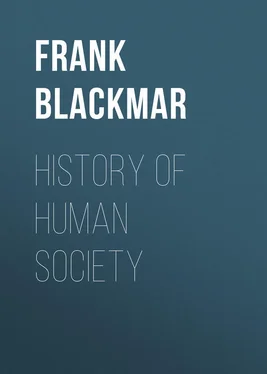Frank Blackmar - History of Human Society
Здесь есть возможность читать онлайн «Frank Blackmar - History of Human Society» — ознакомительный отрывок электронной книги совершенно бесплатно, а после прочтения отрывка купить полную версию. В некоторых случаях можно слушать аудио, скачать через торрент в формате fb2 и присутствует краткое содержание. ISBN: , Жанр: foreign_antique, foreign_prose, на английском языке. Описание произведения, (предисловие) а так же отзывы посетителей доступны на портале библиотеки ЛибКат.
- Название:History of Human Society
- Автор:
- Жанр:
- Год:неизвестен
- ISBN:http://www.gutenberg.org/ebooks/30610
- Рейтинг книги:3 / 5. Голосов: 1
-
Избранное:Добавить в избранное
- Отзывы:
-
Ваша оценка:
- 60
- 1
- 2
- 3
- 4
- 5
History of Human Society: краткое содержание, описание и аннотация
Предлагаем к чтению аннотацию, описание, краткое содержание или предисловие (зависит от того, что написал сам автор книги «History of Human Society»). Если вы не нашли необходимую информацию о книге — напишите в комментариях, мы постараемся отыскать её.
History of Human Society — читать онлайн ознакомительный отрывок
Ниже представлен текст книги, разбитый по страницам. Система сохранения места последней прочитанной страницы, позволяет с удобством читать онлайн бесплатно книгу «History of Human Society», без необходимости каждый раз заново искать на чём Вы остановились. Поставьте закладку, и сможете в любой момент перейти на страницу, на которой закончили чтение.
Интервал:
Закладка:
The great development of art, literature, philosophy, and politics among the ancient Greeks was inefficient in raising the great masses of the people to a higher plane of living, but the fruits of the lives of these superiors were handed on to other groups to utilize, and they are not without influence over the whole human group of to-day. So, too, the religious mystic philosophy and literature of India represented a high state of mental development, but the products of its existence left the races of India in darkness because the mystic philosophy was not adaptable to the practical affairs of life. The Indian philosophers may have handed on ideas which caused admiration and wonder, but they have had very little influence of a practical nature on Western civilization. So society may make progress in either art, religion, or government for a time, and then, for the want of adaptation to the conditions imposed by progress, the effects may disappear. Yet not all is lost, for some achievements in the form of tools are passed on through social heredity and utilized by other races. In the long run it is the total of the progress of the race, the progress of the whole, that is the final test.
Social Progress Involves Individual Development . – If we trace progress backward over the trail which it has followed, there are two lines of development more or less clearly defined. One is the improvement of the racial stock through the hereditary traits of individuals. The brain is enlarged, the body developed in character and efficiency, and the entire physical system has changed through variation in accordance with the laws of heredity. What we observe is development in the individual, which is its primary function. Progress in this line must furnish individuals of a higher type in the procession of the generations. The other line is through social heredity, that is the accumulated products of civilization handed down from generation to generation. This gives each succeeding generation a new, improved kit of tools, it brings each new generation into a better environment and surrounds it with ready-made means to carry on the improvement and add something for the use of the next generation. Knowledge of the arts and industries, language and books, are thus products of social heredity. Also buildings, machinery, roads, educational systems, and school buildings are inherited.
Connected with these two methods of development must be the discovery of the use of the human mind evidenced by the beginning of reflective thought. It is said by some writers that we are still largely in the age of instincts and emotions and have just recently entered the age of reason. Such positive statements should be considered with a wider vision of life, for one cannot conceive of civilization at all without the beginning of reflective mental processes. Simple inventions, like the use of fire, the bow-and-arrow, or the flint knife, may have come about primarily through the desire to accomplish something by subjecting means to an end, but in the perfection of the use of these things, which occurred very early in primitive life, there must have been reflective thinking in order to shape the knife for its purpose, make the bow-and-arrow more effective, and utilize fire for cooking, heating, and smelting. All of these must have come primarily through the individual initiative.
Frequent advocates of social achievement would lead one to suppose that the tribe in need of some method of cutting should assemble and pass the resolution that a flint knife be made, when any one knows it was the reflective process of the individual mind which sought adaptation to environment or means to accomplish a purpose. Of course the philosopher may read many generalizations into this which may confuse one in trying to observe the simple fact, for it is to be deplored that much of the philosophy of to-day is a smoke screen which obscures the simple truth.
The difference of races in achievement and in culture is traced primarily to hereditary traits developed through variation, through intrinsic stimuli, or those originating through so-called inborn traits. These traits enable some races to achieve and adapt themselves to their environment, and cause others to fail. Thus, some groups or races have perished because of living near a swamp infested with malaria-carrying mosquitoes or in countries where the food supply was insufficient. They lacked initiative to move to a more healthful region or one more bountiful in food products, or else they lacked knowledge and skill to protect themselves against mosquitoes or to increase the food supply. Moreover, they had no power within them to seek the better environment or to change the environment for their own advancement. This does not ignore the tremendous influence of environment in the production of race culture. Its influence is tremendous, especially because environmental conditions are more under the direction of intelligence than is the development of hereditary traits.
Some writers have maintained that there is no difference in the dynamic, mental, or physical power of races, and that the difference of races which we observe to-day is based upon the fact that some have been retarded by poor environment, and others have advanced because of fortunate environment. This argument is good as far as it goes, but it does not tell the whole story. It does not show why some races under good environment have not succeeded, while others under poor environment have succeeded well. It does not show why some races have the wit to change to a better environment or transform the old environment.
There seems to be a great persistency of individual traits, of family traits, and, in a still larger generalization, of racial traits which culture fails to obliterate. As these differences of traits seem to be universal, it appears that the particular combination which gives motor power may also be a differentiation. At least, as all races have had the same earth, why, if they are so equal in the beginning, would they not achieve? Had they no inventive power? Also, when these so-called retarded races came in contact with the more advanced races who were superior in arts and industries, why did they not borrow, adapt, and utilize these productions? There must have been something vitally lacking which neither the qualities of the individual nor the stimulus of his surroundings could overcome. Some have deteriorated, others have perished; some have reached a stationary existence, while others have advanced. Through hereditary changes, nature played the game in her own way with the leading cards in her own hand, and some races lost. Hence so with races, so with individuals.
Progress Is Enhanced by the Interaction of Groups and Races . – The accumulation of civilization and the state of progress may be much determined by the interaction of races and groups. Just as individual personality is developed by contact with others, so the actions and reactions of tribes and races in contact bring into play the utility of discoveries and inventions. Thus, knowledge of any kind may by diffusion become a heritage of all races. If one tribe should acquire the art of making implements by chipping flint in a certain way, other tribes with which it comes in contact might borrow the idea and extend it, and thus it becomes spread over a wide area. However, if the original discoverer used the chipped flint for skinning animals, the one who would borrow the idea might use it to make implements of warfare.
Thus, through borrowing, progress may be a co-operative process. The reference to people in any community reveals the fact that there are few that lead and many that follow; that there is but one Edison, but there are millions that follow Edison. Even in the educational world there are few inventors and many followers. This is evidence of the large power of imitation and adaptation and of the universal habit of borrowing. On the other hand, if one chemical laboratory should discover a high explosive which may be used in blasting rock for making the foundations for buildings, a nation might borrow the idea and use it in warfare for the destruction of man.
Читать дальшеИнтервал:
Закладка:
Похожие книги на «History of Human Society»
Представляем Вашему вниманию похожие книги на «History of Human Society» списком для выбора. Мы отобрали схожую по названию и смыслу литературу в надежде предоставить читателям больше вариантов отыскать новые, интересные, ещё непрочитанные произведения.
Обсуждение, отзывы о книге «History of Human Society» и просто собственные мнения читателей. Оставьте ваши комментарии, напишите, что Вы думаете о произведении, его смысле или главных героях. Укажите что конкретно понравилось, а что нет, и почему Вы так считаете.












